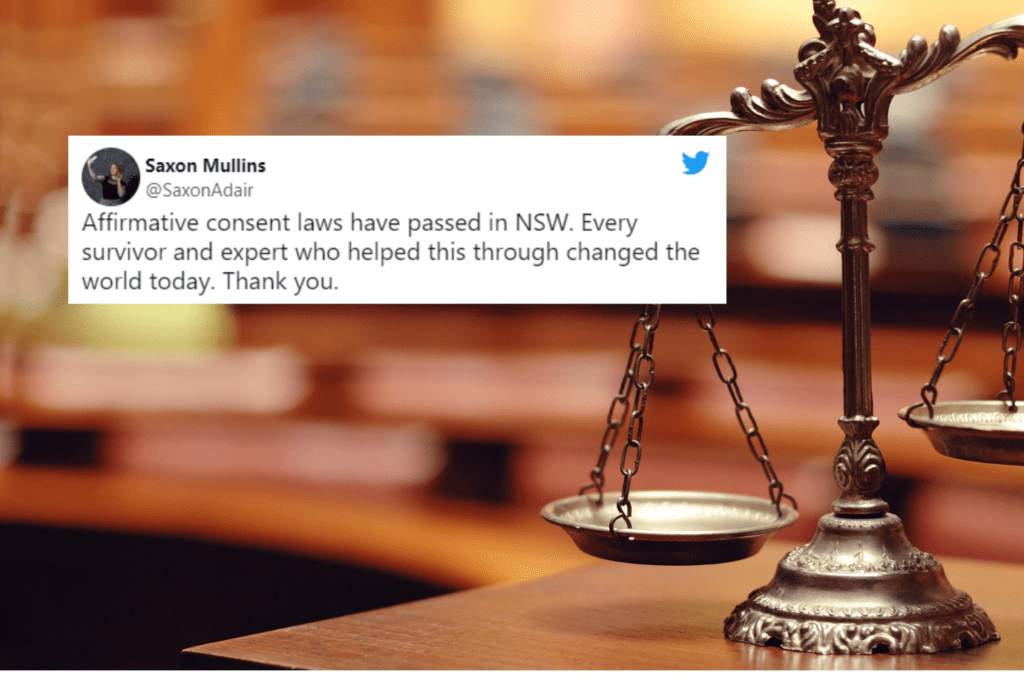Affirmative sexual consent laws passed through the NSW parliament on Tuesday, marking a big win for survivors and advocates who have worked tirelessly for the overhaul of the state’s consent laws.
The NSW parliament adopted a new, affirmative consent model that means if a person wants to engage in sexual activity with someone, then they need to do or say something to establish the other person has consented. Consent is no longer something that can be presumed.
NSW Attorney-General Mark Speakman said the reforms are “common sense” and are designed to simplify consent laws and to ensure more effective prosecutions of sexual offences.
“No law can ever erase the trauma of sexual assault, but we have listened to calls for change and consulted victim-survivors and legal experts to improve our response to sexual violence,” Speakman said.
The passing of the affirmative consent model is historic, and it means there will be a change to the way sexual assault cases are prosecuted, with defendants having to show they took active steps to obtain consent.
Speakman said it “reinforces the basic principle of common decency that consent is a free choice involving mutual and ongoing communication and reinforces that consent should not presumed”.
Speakman made special mention of Saxon Mullins, the Director of Advocacy at Rape and Sexual Assault Research and Advocacy, who has worked hard for this result.
“I commend particularly survivor Saxon Mullins for her extraordinary bravery in sharing her lived experience and her tireless advocacy for victim-survivors to ensure their voices were heard, all of which has contributed to the passage of these reforms,” he said.
Greens MP Jenny Leong celebrated the news on social media, calling it “huge” and “important” reform.
“YES! A bill to introduce an affirmative model of consent has just cleared the final hurdle and passed through the NSW Parliament. That’s it! We did it! This is huge, important, vital reform and will help to deliver justice for survivors of sexual assault,” she said.
“Thank you to every single one of you who took to the streets to say enough is enough, who wrote letters and emails, who talked to your family and friends about why this reform is so important – this is for you. To all the survivors, activists, feminists and experts who put everything they had into making this happen – this is for you. To Saxon Mullins who gave up her anonymity to share her story and put NSW on notice, who brought others along with her with such strength and care – this is for you.”
In a statement, Speakman said the new requirement to actively seek out consent for sexual activity is “not onerous”.
“It does not make consensual sex illegal. It does not stop consensual sex. It does not require a written agreement or script, or stifle spontaneity. It’s a matter of common sense and respect.”
On Twitter, Saxon Mullins celebrated the news, writing: “Not sure if I want to cry, dance, or drink champagne. Think I’m going to do a combination of all three”.
Hayley Foster, CEO of Full Stop Australia said the affirmative consent laws are “truly remarkable legislation”.
“We have been working alongside many fearless women for decades to achieve this reform, but I don’t believe we would have achieved it today if it was not for the courage and conviction of Saxon Mullins and her organisation, Rape and Sexual Assault Research and Advocacy,” Foster told Women’s Agenda.
“Saxon captured the hearts and minds of the community and indeed the Attorney General in NSW, and advocated persistently in the face of so many challenges until it was achieved. We are all so grateful for her leadership.”
Foster also said she was pleased to see an amendment that included clarifying that cognitive or mental health impairments must be a “substantial” cause for failing to seek consent.
“We’re also pleased to see a narrowing of the mental ill health loophole that would have seen someone with a mental illness, such as anxiety or depression being able to argue that this illness was ‘a’ cause of them not actively seeking consent,” she said.
“Now, with the amendment originally put up by the Greens in the Lower House and then by Labor in the Upper House, accused persons will need to at least show that it was a “substantial” cause of them not taking steps to ascertain consent.”
If you or someone you know is impacted by sexual assault, call 1800RESPECT on 1800 737 732 or visit 1800RESPECT.org.au. In an emergency, call 000.


